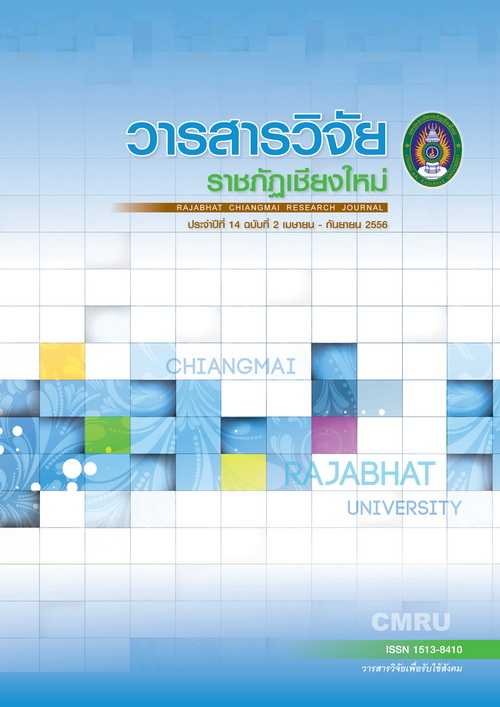ปัจจัยที่มีอิทธิพลต่อพฤติกรรมการประหยัดไฟฬา ของครัวเรือนในตำบลแม่หล่าย จังหวัดแพร่
DOI:
https://doi.org/10.14456/rcmrj.2013.96145Keywords:
พฤติกรรมการประหยัดไฟฟ้า, แผนพลังงานชุมซน, Electricity saving behaviors, Local energy planning (LEP)Abstract
การวิจัยครั้งนี้มีวัตถุประสงค์คือ ศึกษาระดับพฤติกรรมการประหยัดไฟฟ้าของครัวเรือน เปรียบเทียบพฤติกรรมการประหยัดไฟฟ้าระหว่างครัวเรือนที่มีคุณลักษณะทางสังคมประซากร การรับรู้ข่าวสาร ความรู้ ทัศนคติที่แตกต่างกัน และศึกษาปัจจัยที่มีอิทธิพลต่อพฤติกรรมการประหยัดไฟฟ้า เป็นการศึกษาข้อมูลเซิงปริมาณ กลุ่มตัวอย่างคือ ครัวเรือนในตำบลแม่หล่าย จังหวัดแพร่ จำนวน 322 ครัวเรือน โดยแบ่งตามจำนวนครัวเรือนในแต่ละหมู่บ้านและใช้วิธีลุ่มแบบตามสะดวกเครื่องมือที่ใช้คือ แบบสอบถามและแบบทดสอบ สถิติที่ใช้คือ การแจกแจงความถี่ ร้อยละ ค่าเฉลี่ยเลขคณิต ส่วนเบี่ยงเบนมาตรฐาน การทดสอบสมมติฐาน ใช้การวิเคราะห์ค่าทีและการวิเคราะห์ความแปรปรวน การวิเคราะห์ปัจจัยที่มือิทธิพลต่อพฤติกรรมการประหยัดไฟฟ้า ใช้การวิเคราะห์การถดถอยพหุคูณ โดยกำหนดระดับนัยสำคัญไว้ที่ระดับ .05 ผลการศึกษาพบว่า
พฤติกรรมการประหยัดไฟฟ้าของครัวเรือนอยู่ในระดับสูง ครัวเรือนที่มืเพศแตกต่างกันมืทัศนคติและพฤติกรรมการประหยัดไฟฟ้าแตกต่างกัน ครัวเรือนที่มือายุและการศึกษาแตกต่างกันมืพฤติกรรมการประหยัดไฟฟ้าแตกต่างกัน ครัวเรือนที่เช้าร่วมโครงการแตกต่างกันมืการรับรู้ข่าวสาร ความรู้ ทัศนคติและพฤติกรรมการประหยัดไฟฟ้าแตกต่างกัน ครัวเรือนที่มืการรับรู้ข่าวสาร ความรู้ ทัศนคติแตกต่างกันมืพฤติกรรมการประหยัดไฟฟ้าแตกต่างกันอย่างมืนัยสำคัญทางสถิติ และปัจจัยที่มือิทธิพลทางบวกต่อพฤติกรรมการประหยัดไฟฟ้าของครัวเรือนคือ ทัศนคติ เนื้อหาข่าวสาร จำนวนครั้งเช้าร่วมโครงการผู้ให้ข่าวสาร สถานภาพสมรส ส่วนปัจจัยที่มือิทธิพลทางลบต่อพฤติกรรมการประหยัดไฟฟ้าของครัวเรือนคือ เพศ รายได้ครัวเรือน และแหล่งข่าวสาร
FACTORS INFLUENCING HOUSEHOLD’S ELECTRICITY SAVING BEHAVIORS IN MAELAJ SUB-DISTRICT, PHRAE PROVINCE
The purposes of this survey research were to study households’ levels of electricity saving behaviors, compare electricity saving behaviors among the households’ having different socio-demographic characteristics, information perception, knowledge and attitude and explore factors influencing households’ electricity saving behaviors. The sample sizes for quantitative data were 322 households in Maelai Sub-district, Phrae Province, divided in proportion households of each village, and convenient sampling was used. A survey questionnaires and test-questionnaires were used. Descriptive statistics were used for analyzing frequency, percentage, mean and standard deviation. Statistical methods used for hypotheses testing were t-test and Analysis of Variance. Multiple Regression Analysis were used for analyzing factors influencing households’ electricity saving behaviors with 0.05 level of statistical significance. The results were as follows:
The households exhibited high level of electricity saving behaviors. The households having different gender exhibited differences in attitude towards electricity saving, the households having different age and education exhibited differences in electricity saving behaviors, the households participating in the project exhibited differences in information perception, knowledge, attitude and electricity saving behavior, the households having differences in new perception, knowledge and attitude exhibited differences in electricity saving behaviors. Factors having positively influence on electricity saving behaviors were attitude, information contents, and frequency of participation, information senders, and married status. On the other hand, factors having negatively influence on electricity saving behaviors were gender, income, and information sources.
Downloads
Downloads
How to Cite
Issue
Section
License
1. Articles, information, content, images, etc published in the “Community and Social Development Journal” are copyrighted by the Community and Social Development Journal, Chiang Mai Rajabhat University. In order to properly distribute the articles through print and electronic media, the authors still hold the copyright for the published articles under the Creative Commons Attribution (CC BY) license, which allows the re-distribution of the articles in other sources. References must be made to the articles in the journal. The authors are responsible for requesting permission to reproduce copyrighted content from other sources.
2. The content of the articles appearing in the journal is the direct responsibility of the article authors. The editorial board of the journal does not necessarily agree with or share any responsibility.














